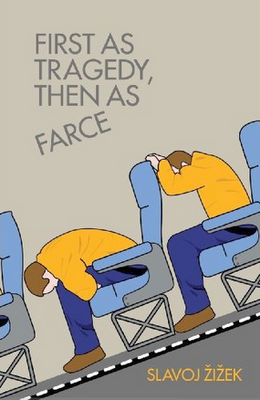First As Tragedy, Then As Farce

Slovenian philosopher and cultural critic Slavoj Žižek’s latest work—a call to the Left to reinvent itself in a time of international crisis—begins with a nod to Marx’s correction of Hegel in The Eighteenth Brumaire Of Louis Bonaparte: “Hegel remarks somewhere that all great events and characters of world history occur, so to speak, twice. He forgot to add: the first as tragedy, the second time as farce.” Indeed, when you examine the two speeches that bookend former President Bush’s term in office—the one in the aftermath of 9/11, and the one in which he addressed the global financial meltdown—you begin to notice that the first (the tragedy) sounds remarkably similar to the second (the farce).
Many people have known for years that the global banking system was on the verge of collapse. For more than a decade, police have been summoned to disperse protests around the world in which activists have called for more transparency and accountability. Last year, Naomi Klein wrote about the relationship between ideology and economics—the fact that there is no such thing as a neutral market—in The Shock Doctrine.
When the markets finally did crumble, instead of compulsively tossing billions of dollars at a problem, we would do well to reflect on how it came to be. In First As Tragedy, Then As Farce, Žižek is highly critical of the Right’s shortsighted call to “Save Main Street, not Wall Street!” which fails to recognize that most obvious capitalistic principles: in a capitalist society, Main Street cannot exist without Wall Street. Period.
Žižek explores the idea that the Left should stop apologizing in the face of the Right’s moralistic blackmail. Instead of focusing on supposedly dismal or inappropriate cultural shifts, the Right should be held fully accountable for the devastating economic recession. In general, meltdowns—of economic, cultural, or nationalistic stability—should awaken us instead of being bandaged over to allow the dream to continue. That is, 9/11, much like the banking crisis, should have served as an ideological wake-up call. Asserting additional military force in the Middle East or bailing out failing banks and corporations like General Motors with taxpayer money does nothing but continue a cycle of confusing ignorance for the general public. It promotes a type of populist conservatism in which middle class people literally vote against their own self interest.
Of the many admirable qualities in his work, what I like best about Žižek is his ability to masterfully dissect U.S. policy. One might argue that Slovenia’s problems deserve such a critical eye, but I appreciate that Žižek so eloquently dismantles problematic American foreign policy and class war disguised as culture war from an outsider’s perspective. A European Chomsky of sorts, Žižek’s theory is a must-read for any scholar or layperson interested in twenty-first century capitalism, economics, and contemporary Leftist thought.